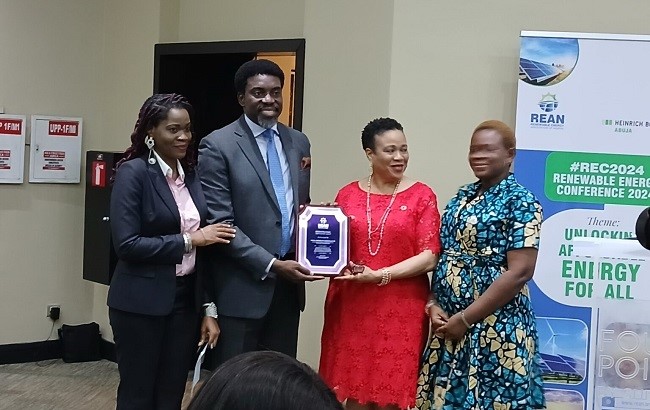The Lagos State Government (LASG) has commended the Renewable Energy Association of Nigeria (REAN) for its advocacy in promoting renewable energy solutions as a key response to Nigeria’s energy crisis.

Mr Abiodun Ogunleye, Commissioner for Energy and Mineral Resources, said this in his keynote address at the 2024 Renewable Energy Conference organised by the association on Tuesday, November 5, in Lagos.
The theme of the conference is “Unlocking Affordable Energy for All”.
Ogunleye, represented by Mrs Abiola Kosegbe, Permanent Secretary, Ministry of Energy and Mineral Resources, praised REAN for its role in raising awareness about sustainable energy initiatives and fostering collaboration among stakeholders.
He said that this would ensure affordable and accessible energy solutions for both businesses and households across Lagos State.
Ogunleye also said that the conference served as a platform to discuss innovative strategies for improving Nigeria’s energy landscape.
He highlighted the importance of making affordable energy a fundamental right for all Nigerians, not a privilege.
“Affordable energy must be accessible to every Nigerian household, including those in low-income urban and rural areas.
“By adopting hybrid systems that combine solar with mini-grids, we can address the unique energy needs of these populations,” Ogunleye said.
He emphasised the necessity of inclusivity in energy strategies, specifically focusing on gender-positive programs that involve women in the energy transition process.
“Women, who are often most impacted by energy poverty, can be transformative leaders in their communities, Ogunleye added.
The commissioner also provided an update on the state’s ongoing energy initiatives, including the passage of the Lagos Electricity Bill 2024 by the State House of Assembly, which awaits the governor’s assent.
He said that this bill was expected to provide a legal foundation for the state’s clean energy projects.
Ogunleye also highlighted the Lagos Integrated Resource Plan and the Energy Transition Plan as key documents guiding the state’s shift toward renewable energy, as well as ongoing collaborations with local distribution companies to refine the state’s energy strategy.
In his remarks, Mr Ayo Ademilua, President of REAN, called for more concerted efforts to ensure that affordable renewable energy solutions are accessible nationwide.
He stressed that transitioning to renewable energy was not only critical for Nigeria’s sustainable development but also essential for economic growth, job creation, and energy security.
Ademilua appealed to the government and financial institutions to increase funding and financial support to accelerate the adoption of renewable energy technologies across the country, particularly in underserved and rural areas.
“Access to finance remains one of the biggest challenges in expanding renewable energy in Nigeria.
“To tackle this, we need tailored funding models and increased investment in the sector,” Ademilua said.
He emphasised the importance of creating innovative financing mechanisms, including concessional loans, subsidies for renewable energy systems, and Pay-As-You-Go (PAYG) options that have been successful in other African countries.
These solutions, according to REAN, could make renewable energy more affordable for small businesses and low-income households, who are most vulnerable to high energy costs.
The association also advocated for the creation of a dedicated Renewable Energy Fund, which would provide low-interest loans and grants for renewable energy projects, particularly in off-grid areas where traditional electricity infrastructure is inadequate or absent.
“The potential for renewable energy in Nigeria is enormous. However, to fully harness this potential, we need more investment and stronger policy support,” Ademilua said.
He also recommended tax incentives, import duty exemptions, and public-private partnerships as essential tools to support the renewable energy transition.
He called for increased funding and policy support highlights the urgent need for a comprehensive, collaborative approach to Nigeria’s energy challenges.
According to him, the association believes that with the right investments, renewable energy can drive economic growth, create jobs, and help Nigeria achieve its climate goals.
“As Nigeria grapples with its ongoing energy crisis, the need for sustainable, affordable, and accessible energy solutions has never been more pressing.
“Both the government and the private sector must work together to ensure that renewable energy becomes a cornerstone of Nigeria’s economic future,” he explained.
By Yunus Yusuf
